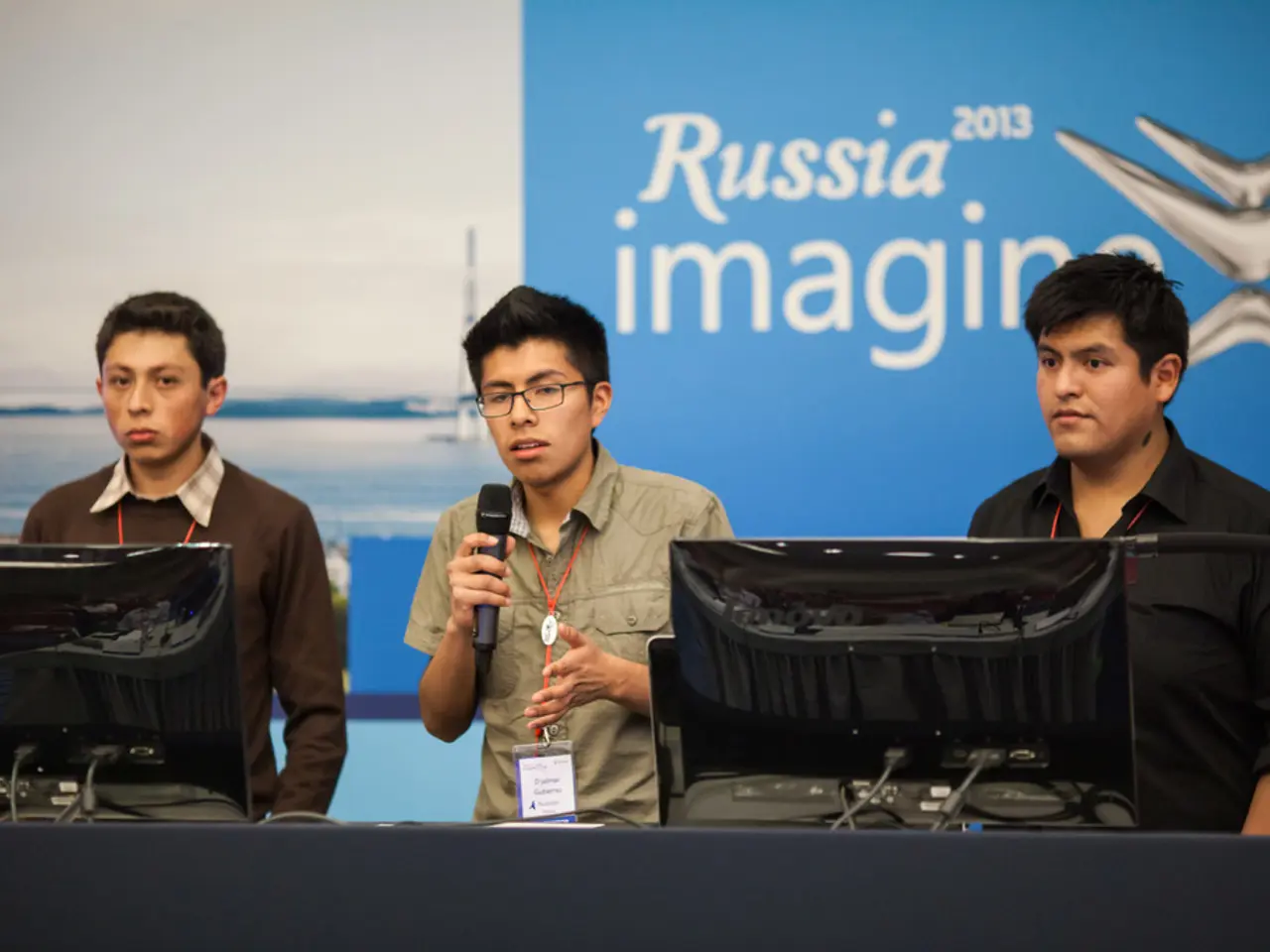Trump advocates for Intel CEO's dismissal due to suspected connections with China
In the rapidly evolving world of technology, Intel CEO Lip-Bu Tan has found himself at the centre of a political and geopolitical storm. Tan's investments in numerous Chinese technology companies, some with alleged military ties, have raised concerns among U.S. politicians and national security experts.
Senator Tom Cotton, representing Arkansas, has written a letter to the chair of Intel's board of directors, expressing concern over Tan's investments and connections with semiconductor firms linked to the Chinese Communist Party and the People's Liberation Army. The letter asks if any measures were taken to address concerns about Tan's activities, and if he has disclosed any remaining investments, professional roles, or other Chinese ties to the US government.
The controversy surrounding Tan took a public turn when former President Donald Trump called for the immediate resignation of Intel's CEO on his Truth Social network. However, after Tan met with White House officials, that call for resignation was walked back.
Tan responded publicly by affirming his commitment to U.S. national security and economic growth. He emphasized his love for the U.S. and Intel, and his focus on rebuilding the company's strength and supporting American technological leadership. Tan stated that his extensive career—spanning over 40 years and including his work at firms like Walden International and Cadence Design Systems—has always adhered to the highest legal and ethical standards.
Despite the controversy, Intel’s board of directors has shown support for Tan. However, the scrutiny has impacted Intel’s public image and stock performance, contributing to an already challenging environment with Intel facing significant financial losses and competitive pressures in the semiconductor industry.
It is important to note that it is not illegal for US citizens to hold stakes in Chinese companies, even those with ties to the Chinese military, if these companies are not listed on the US Treasury's Chinese Military-Industrial Complex Companies List.
The US government is seeking to address concerns about Tan's investments and connections with semiconductor firms linked to the Chinese Communist Party and the People's Liberation Army. At least eight of these Chinese companies have ties to the Chinese military, according to Senator Cotton.
Intel, in its quest to remain a leader in the semiconductor industry, has received significant financial support from the U.S. government. Intel was awarded nearly $8 billion from the CHIPS and Science Act, the largest grant to a single company. The company also received a separate $3 billion for the Secure Enclave program last year.
Amidst this, Intel opened an innovation hub in the city of Shenzhen, despite Washington's increasingly strict sanctions. This move has sparked further debate about the balance between technological advancement and national security.
The controversy surrounding Lip-Bu Tan continues to unfold, with the U.S. government and Intel's board of directors seeking to address the concerns raised by Senator Cotton and others. The future of Tan's tenure at Intel remains uncertain, as the debate surrounding his investments and connections continues.
[1] Reuters. (2024). U.S. senator questions Intel CEO's ties to China. [online] Available at: https://www.reuters.com/business/us-senator-questions-intel-ceos-ties-china-2024-03-15/
[2] The Hill. (2025). Trump calls for Intel CEO's resignation over China ties. [online] Available at: https://thehill.com/policy/technology/548535-trump-calls-for-intel-ceos-resignation-over-china-ties
[3] CNBC. (2025). Intel CEO meets with White House officials amid calls for resignation. [online] Available at: https://www.cnbc.com/2025/03/20/intel-ceo-meets-with-white-house-officials-amid-calls-for-resignation.html
[4] Intel. (2025). Intel CEO Lip-Bu Tan's statement on recent media reports. [online] Available at: https://www.intel.com/content/www/us/en/newsroom/press-kits/2025/intel-ceo-lip-bu-tan-statement-on-recent-media-reports.html
- The political and geopolitical concerns over Intel CEO Lip-Bu Tan's investments in Chinese technology companies, some with alleged military ties, have raised issues of national security and economic growth.
- Senator Tom Cotton has written to the chair of Intel's board of directors, expressing concerns over Tan's investments and connections with semiconductor firms linked to the Chinese Communist Party and the People's Liberation Army.
- Despite the controversy, Intel’s board of directors has shown support for Tan, but the scrutiny has impacted Intel’s public image and stock performance.
- In its quest to remain a leader in the semiconductor industry, Intel has received significant financial support from the U.S. government, as shown by the nearly $8 billion grant from the CHIPS and Science Act and a separate $3 billion for the Secure Enclave program.
- The ongoing controversy surrounding Lip-Bu Tan continues to unfold, with the U.S. government and Intel's board of directors seeking to address the concerns raised by Senator Cotton and others, potentially impacting Tan's tenure at Intel.







